It’s almost unthinkable now — the idea that Kentucky basketball, the gold standard of college hoops, was once teetering on the edge of complete collapse. But in the late 1980s, the program stood in the crosshairs of one of the most damaging scandals in NCAA history, a crisis so severe that it nearly resulted in the program’s “death penalty.”
At the center of the storm? A package, an assistant coach, and a torn envelope that changed everything.
The Torn Envelope That Rocked the Bluegrass
The flashpoint came in 1988. An overnight Emery Air Freight package burst open in transit, revealing $1,000 in cash. The envelope was reportedly addressed to the father of Kentucky recruit Chris Mills and linked to Wildcats assistant coach Dwane Casey. The imagery was scandalous — cash meant for a player’s family, sent through a shipping company, exposed in a way that left the Wildcats’ storied program scrambling for answers.
Though Casey denied wrongdoing and later successfully sued for defamation, the damage was done. The “torn envelope” became a symbol of something far bigger — a growing belief that the Kentucky program, under head coach Eddie Sutton, had lost control.
A Web of Violations
The cash incident was only one part of a larger, tangled mess. NCAA investigators uncovered a series of recruiting violations, improper benefits, and academic fraud allegations, including accusations that player Eric Manuel had cheated on his ACT. The picture painted was one of a powerhouse that had lost its discipline and oversight.
By the time the NCAA was done, the sanctions were brutal:
Three years probation
Two-year postseason ban (1989–90 and 1990–91 seasons)
One-year television ban
Scholarship reductions
Vacated 1988 NCAA Tournament appearance
Kentucky basketball, the pride of the Bluegrass, was stripped bare. The Wildcats’ once-feared name was now synonymous with scandal.
Eddie Sutton’s Exit
The fallout was swift. Head coach Eddie Sutton, despite denying any personal involvement in the violations, resigned under pressure in March 1989. His coaching staff followed, as did athletic director Cliff Hagan. In just a matter of weeks, Kentucky went from a program with championship aspirations to one fighting for its very survival.
At that moment, the question wasn’t whether Kentucky could compete for titles again — it was whether they could even recover their reputation.
Enter Rick Pitino
That summer, Kentucky turned to an unlikely savior. Rick Pitino was fresh off a stint with the New York Knicks, where he’d built a reputation for high-pressure defense, a relentless work ethic, and a willingness to take on impossible challenges.
When Pitino arrived in Lexington in 1989, he inherited a program handcuffed by sanctions. No TV exposure for an entire season. No NCAA Tournament for two years. A roster gutted by the departures of top talent. To the outside world, Kentucky basketball had nothing to sell except a promise of better days.
But Pitino saw opportunity where others saw ruin. He embraced the challenge with a fearless energy, implementing an up-tempo offense, suffocating full-court press, and a culture built on discipline and intensity.
Building From the Ashes
The early years were about survival. With the postseason ban still in place, Pitino focused on reshaping the culture and rebuilding player confidence. The Wildcats scraped together a 14–14 record in his first year — a far cry from championship glory, but a foundation nonetheless.
By the time Kentucky returned to the postseason, the transformation was visible. Pitino’s teams played with swagger, confidence, and a relentless motor. The fans — the Big Blue Nation — who had endured humiliation during the scandal, once again had a program they could be proud of.
The Unforgettables & The Redemption
The defining moment of Pitino’s Kentucky resurrection came in the early 1990s with a group of players affectionately known as “The Unforgettables” — Richie Farmer, Deron Feldhaus, John Pelphrey, and Sean Woods. These were not McDonald’s All-Americans or NBA-bound stars; they were hardworking, loyal players who stayed with the program through the darkest times.
In 1992, the Wildcats faced Duke in what became one of the greatest college basketball games ever played — the Elite Eight showdown ending with Christian Laettner’s legendary buzzer-beater. Kentucky lost, but the game marked a turning point. The Wildcats were back among the elite, not just in talent, but in respect.
From Scandal to Champions
Just a few years later, Pitino completed the journey. In 1996, Kentucky won the NCAA National Championship, a team so dominant they were nicknamed “The Untouchables.” Pitino had taken the program from scandal-ridden rubble to the top of the college basketball world in seven years.
The Lasting Legacy
Looking back now, the story almost feels like a Hollywood script — the powerhouse brought low by scandal, the near-destruction of a proud tradition, and the fiery coach who rebuilt it all.
The “torn envelope” will forever be a cautionary tale in Kentucky history, but the era that followed proved something more important: no matter how far a program falls, the right leadership, culture, and belief can bring it back.
Rick Pitino didn’t just win games in Lexington — he restored an identity. He gave Big Blue Nation their swagger back. And in doing so, he ensured that Kentucky basketball would not only survive, but thrive again.





















